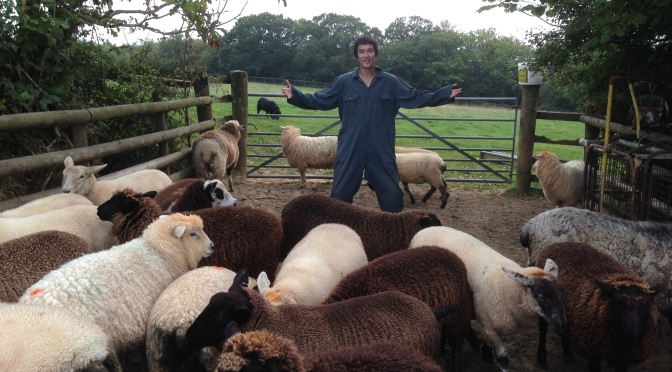Tanya Dzekon
Staff Writer
Sam Wilder wakes up at 7:30 a.m. everyday to eat his breakfast and do his Tai Chi stretches before heading to the stables to work with horses. After that, he tends to the garden — watering the plants and keeping up with pest-control — before finishing his day wrangling a flock of sheep. Wilder is volunteering through World Wide Opportunities on Organic Farms (WWOOF) on a farm in the hamlet of Virginstow, England. Volunteers like Wilder call themselves WWOOFers (pronounced “woofers’) and they provide a helping hand on a farm within the WWOOF network in exchange for a place to stay and three meals a day.
At this time last year, Wilder ’14 was a senior at USF, majoring in media studies and minoring in urban agriculture. He worked as a research assistant for media studies professor David Silver and helped out with the USF community garden. For Wilder, joining WWOOF was part of continuing his education.
“I am pushing myself to keep trying to learn after graduation,” he said. Besides picking up new skills like butchery, sheep deworming, and animal husbandry, Wilder has also been practicing his Spanish.
Wilder also decided to join WWOOF because it is a cheap way to travel around the world. He used the money he saved up before his travels on airfare and sightseeing trips, but didn’t have to pay European prices for meals and housing.
“I knew I wanted to travel long-term, not just two weeks,” Wilder added.
He started his journey in Spain, where he worked at a farm in the mountains of Barcelona, made his way to England where he is now, and intends to end his European trip in Portugal working at a permaculture center.
A volunteer has to sign up individually with WWOOF in each country he or she intends to travel to and pays a small subscription fee to access their network (20 euros in Spain, 20 pounds in England) for a year. After that, the volunteer is free to get in touch with farmers around the country to plan his or her stay. Wilder recommends doing a lot of research and contacting as many hosts as possible before committing to work on a farm.
Through being involved with WWOOF, “[I gained] a greater understanding of how people can live so sustainably, with zero-waste,” Wilder said. The farm that he is currently working makes sure to use every part of a slaughtered animal. The bones are used to make stock, the vegetable waste is fed to the pigs, and animal organs that you wouldn’t normally find on a restaurant menu are served for dinner.
“I’m eating a lot of weird food…and it’s really healthy,” said Wilder. He cited ram testicles as one of the strangest foods he has tried at the farm.
Wilder writes about his farm life and travels, and documents it through photographs and videos on his blog, “Wilder Life.” His latest blog entry was a photo essay about making lamb and chicken stock from scratch.
“After graduation, I wanted to continue producing media and making stuff, and I wanted to keep a connection with people back home,” Wilder said.
To check out the Wilder Life blog, go to http://www.wilderlife.squarespace.com/

